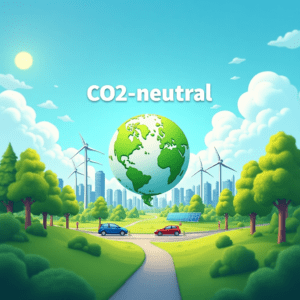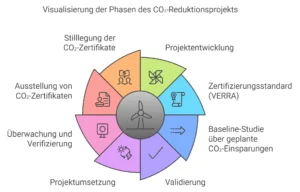Renewable energy offers a wide range of benefits that are both ecologically and economically significant. First of all, they contribute to the reduction of greenhouse gas emissions, which is crucial for climate protection. By switching to renewable energy sources such as solar, wind, and hydropower, we reduce our dependence on fossil fuels, which are responsible for much of global warming.
These clean energy sources are not only sustainable but also inexhaustible, meaning we can use them without harming the environment or endangering future generations. In addition, they create jobs in new industries and foster technological innovations, which can lead to a more stable economy in the long term. Another benefit is energy independence, which can be achieved through the use of renewable energy.
When we source our energy from local resources, we reduce our dependence on imported fossil fuels, which are often subject to political and economic uncertainties. This not only strengthens national security but also stabilizes energy prices. Additionally, renewable energies can help revitalize rural areas by creating new income sources for farmers and communities.
The combination of these advantages makes renewable energy an attractive option for the future.
Key Takeaways
- The advantages of renewable energies:
- Renewable energies are environmentally friendly and sustainable.
- They are inexhaustible and help reduce dependence on fossil fuels.
- Renewable energies create new jobs and strengthen the local economy.
- They help reduce air and water pollution.
- Renewable energies contribute to stabilizing the climate.
- The impact of conventional energies on the environment:
- Conventional energies cause air and water pollution.
- They contribute to global warming and climate change.
- The promotion and burning of fossil fuels destroy ecosystems and habitats.
- Conventional energies have negative effects on human health.
- They are unsustainable and lead to the depletion of natural resources.
- How renewable energies protect the environment:
- Renewable energies produce no harmful emissions.
- They use natural resources like the sun, wind, and water without depleting them.
- Renewable energies contribute to preserving biodiversity.
- They reduce water consumption and protect water bodies.
- By using renewable energies, environmental pollution is reduced.
- Costs and savings when using renewable energies:
- The costs of renewable energies have significantly decreased in recent years.
- By using renewable energies, long-term costs can be saved.
- Investments in renewable energies pay off through lower energy costs.
- The use of renewable energies leads to independence from rising energy prices.
- In the long term, renewable energies are an economically sensible decision.
- The availability of renewable energies:
- Renewable energies are available everywhere, regardless of geographic location.
- Sun, wind, and water are natural resources that can be used continuously.
- The availability of renewable energies is secured in the long term.
- Through technological advances, renewable energies are becoming increasingly efficient.
- The use of renewable energies is decentralized and strengthens local energy supply.
- How you can switch to renewable energies:
- You can reduce your energy consumption and implement energy efficiency measures.
- Invest in solar panels, wind power, or other renewable energy sources for your home.
- Use public transport, cycling, or walking to reduce your carbon footprint.
- Get informed about government support programs and financial incentives for renewable energies.
- Engage in local initiatives and advocate for the expansion of renewable energies.
- The support of renewable energies through government programs:
- Government programs promote the expansion of renewable energies through financial incentives.
- Subsidies and funding make investments in renewable energies easier.
- Laws and regulations support the integration of renewable energies into the energy system.
- Government programs promote research and development in the field of renewable energies.
- Through government support, the transition to renewable energies is accelerated.
- The role of renewable energies in the future of energy supply:
- Renewable energies will play a central role in future energy supply.
- They are crucial for reducing greenhouse gas emissions and protecting the climate.
- The further development of renewable energies is necessary to advance the energy transition.
- Renewable energies offer the possibility of a decentralized and resilient energy supply.
- The future of energy supply will be shaped primarily by renewable energies.
The Impact of Conventional Energies on the Environment
Conventional energy sources, especially fossil fuels like coal, oil, and natural gas, have significant negative effects on our environment. These energy sources are not only responsible for a large portion of global CO2 emissions but also cause air and water pollution. The burning of fossil fuels releases pollutants into the atmosphere, which can cause respiratory diseases and other health problems.
Moreover, oil spills and habitat destruction from coal and oil extraction are devastating for biodiversity and the ecosystems we rely on. Another critical aspect is the impact of conventional energies on the climate. Global warming, caused by the rise in greenhouse gases in the atmosphere, leads to extreme weather events, rising sea levels, and the destruction of habitats.
These changes not only affect nature but also our societies and economies. Agricultural yields can decrease, water scarcity can increase, and entire communities may be forced to leave their homes. The urgency of addressing these issues makes it even more important to transition to sustainable energy sources.
How Renewable Energies Protect the Environment
Renewable energies play a decisive role in protecting our environment. By using solar, wind, and hydropower, we can significantly reduce greenhouse gas emissions. These clean energy sources produce no harmful emissions during their operation and therefore actively contribute to improving air quality.
When we transition to renewable energies, we can not only mitigate the negative impacts of conventional energies but also exert a positive influence on the climate. This is especially important in light of the current climate crisis, which affects us all. Moreover, renewable energies promote the preservation of biodiversity.
By avoiding fossil fuels and instead relying on sustainable energy sources, we reduce the pressure on natural habitats and ecosystems. Wind farms and solar power plants can be designed to harmonize with nature while simultaneously meeting energy needs. This allows us to find a balance between human needs and environmental protection.
The switch to renewable energies is therefore not only a necessity for our planet but also an opportunity to create a sustainable future for future generations.
Costs and Savings with the Use of Renewable Energies
| Type of Renewable Energy | Costs | Savings |
|---|---|---|
| Solar Energy | Investment in solar panels and installation | Reduction of electricity bills |
| Wind Energy | Costs of wind turbines and maintenance | Reduction of dependence on conventional energy sources |
| Hydropower | Construction of hydropower plants | Long-term energy cost savings |
The costs for renewable energies have significantly decreased in recent years, making them an increasingly attractive option. Solar and wind energy are now often cheaper than fossil fuels, which means that we can not only act more environmentally friendly but also save money. These cost reductions are the result of technological advancements and increasing competitiveness in the energy market.
When we invest in renewable energies, we not only benefit from lower electricity bills but also from a more stable price development compared to the volatile prices of fossil fuels. In addition to direct cost savings, there are also long-term financial benefits from using renewable energies. Many countries offer incentives such as tax breaks or subsidies for households and businesses investing in renewable technologies.
These programs can significantly reduce initial investment costs and shorten the payback period. Furthermore, by using renewable energies, we reduce our dependence on imported fuels, which protects us from price fluctuations in the global energy market. Overall, the switch to renewable energies is not only ecologically sensible but can also be economically beneficial.
The Availability of Renewable Energies
The availability of renewable energies is a crucial factor in their success as a sustainable energy source. In many regions of the world, well-developed infrastructures for solar and wind energy already exist, enabling us to efficiently use these resources. Technology has advanced rapidly in recent years, so we are now able to generate energy from renewable sources even in less sunny or windy areas.
This means that almost every household and business can have access to clean energy, regardless of their geographic location. Moreover, innovative solutions like decentralized energy systems and energy storage technologies allow us to use renewable energies even more effectively. By installing solar panels on rooftops or using small wind turbines, we can generate our own electricity while also contributing to the stability of the entire energy system.
These developments make it easier than ever to switch to renewable energies and benefit from their advantages. The availability of these technologies will continue to increase, encouraging us to drive the transition to a more sustainable energy future.
How You Can Switch to Renewable Energies
The transition to renewable energies is a process that each of us can actively shape. First, we should inform ourselves about the different options available to us. This includes solar energy through photovoltaic systems on the roof or wind energy through small wind turbines in the garden.
It is important to check which technologies are best suited to our location and what financial incentives are available. Many communities offer advisory services or organize informational events to support us during this transition. Another step is to reduce our overall energy consumption.
Through simple measures like replacing light bulbs with energy-efficient LEDs or using smart home technologies, we can reduce our electricity consumption while simultaneously lowering our ecological footprint. Once we switch to renewable energies, we maximize the positive impacts on the environment and our finances. Switching to a 100% renewable energy provider is also a way to contribute to sustainable development.
By making conscious decisions and acting actively, we can all be part of the solution.
The Support of Renewable Energies through Government Programs
Government programs play a crucial role in promoting renewable energies and supporting the transition to a more sustainable energy future. Many governments offer financial incentives like subsidies or tax breaks for households and businesses wishing to invest in renewable technologies. These programs not only make it easier for us financially but also demonstrate governments’ commitment to climate protection and the promotion of clean energy sources.
Moreover, there are numerous initiatives to promote research and development in the field of renewable energies. By investing in innovative technologies, we can develop more efficient solutions and improve existing systems. This government support is essential for the sector’s growth and helps make renewable energies more competitive.
If we work together as a society and take advantage of these programs, we can make a significant contribution to combating climate change and create a sustainable future for all.
The Role of Renewable Energies in the Future of Energy Supply
The role of renewable energies in future energy supply will become increasingly important. In view of the pressing challenges of climate change, we must drastically reduce our dependence on fossil fuels and instead rely on sustainable energy sources. Renewable energies offer not only a solution to these challenges but also an opportunity for economic growth and technological innovations.
In a world where resources are becoming scarcer and environmental protection is gaining in importance, they are indispensable for sustainable development. Future energy systems will be increasingly decentralized and rely on local resources. This means that communities will be able to generate their own electricity while reducing their dependence on large energy suppliers.
The transition to renewable energies is therefore not only a technical challenge but also an opportunity for new forms of collaboration and economic development. If we succeed in leveraging the potential of renewable energies, we can create a cleaner, safer, and more sustainable energy future for generations to come.



